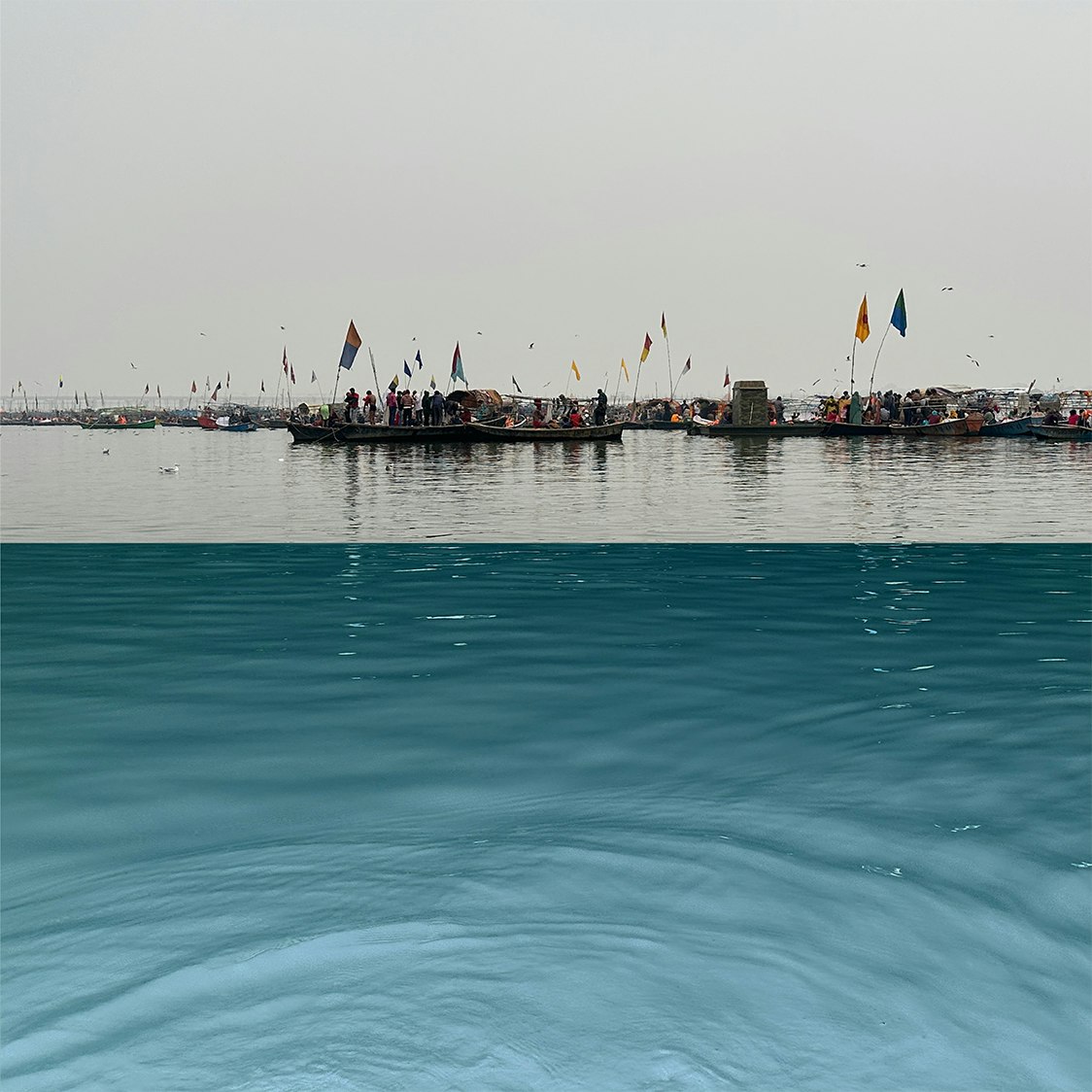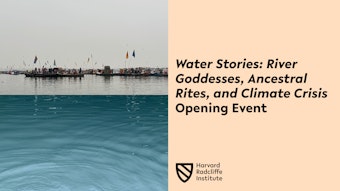Water Stories: River Goddesses, Ancestral Rites, and Climate Crisis

The impact of climate change is felt and measured most intimately through our experience of water, whether that be drought, flooding, or access to safe drinking water. It is no wonder that the climate crisis is also called a water crisis. That crisis disproportionately affects economically disadvantaged areas of the globe, especially the former colonies of Western imperial powers in the Global South. Despite countless news reports on climate disasters in the Global South where all of the top ten deadliest natural disasters of 2022 occurred, it is difficult to grasp fully the effects of climate change when the crisis hits communities outside one’s own.
Water Stories: River Goddesses, Ancestral Rites, and Climate Crisis presents artworks that tell alternative stories of water experience. They treat water not as a commodity to be exploited but as a cyclical, life-giving, life-dissolving, and inert but innately alive spiritual force—a view widely shared among Indigenous communities, especially in the Global South. The exhibition juxtaposes older, traditional paintings depicting myths with works by contemporary artists that evoke various aesthetic experiences of water in the age of climate crisis. Water Stories encourages viewers to appreciate the multivalent meaning of water and to contemplate their own relationship with it.
Viewed through the lens of climate change, stories about a celestial river that saves the ancestors of an ancient sage resonate with the reverence and respect sorely needed to recalibrate humans’ relationship with the environment. Drawn from the collections of the Harvard Art Museums and the Peabody Essex Museum, and featuring works by three contemporary artists, the exhibition illuminates the cultural, religious, and political significance of water while drawing attention to the legacy of colonial rule and imperialism to be found in the climate crisis.
Participating artists include Atul Bhalla (b. 1964, New Delhi, India), Alia Farid (b. 1985, Kuwait), Evelyn Rydz (b. 1979, Miami, Florida), M.F. Husain (b. 1915, Pandharpur, India–d. 2011, London, United Kingdom), and artists once known in South Asia.
See companion website for the exhibition.
Organized by Jinah Kim, Johnson-Kulukundis Family Faculty Director of the Arts, Harvard Radcliffe Institute; George P. Bickford Professor of Indian and South Asian Art and professor of South Asian studies, Harvard Faculty of Arts and Sciences
Harvard Radcliffe Institute gratefully acknowledges the Johnson-Kulukundis Family Endowment Fund for the Arts, which is supporting this exhibition.
Visit
Free and open to the public.
We encourage visitors to reserve a time for their visit to guarantee access.
Press Information
Related Event
Film Screening: Laya Project
Harvard Art Museums (Menschell Auditorium)
November 15, 2023, 6–8 PM
Laya Project is a 2007 documentary film that pays tribute to the resilience of the human spirit through music. Following the devastating tsunami in the Indian Ocean in 2004, the makers of Laya Project visited the shore communities affected heavily by tsunami and documented local folk music of each place. Shot on location in Sri Lanka, Thailand, Indonesia, Maldives, Myanmar, and India, it is a spectacular visual journey with hauntingly beautiful music. Almost two decades after the Indian Ocean tsunami, with ever so frequent climate disasters facing humanity, the film reminds us of the interconnectedness of human existence and our shared responsibility to the earth. The film epitomizes the power of art in fostering resilience in the face of climate crisis.
This screening coincides with the Harvard undergraduate lecture course, HAA81 Art of Monsoon Asia: Interconnected Histories (Jinah Kim) and the exhibition, Water Stories: River Goddesses, Ancestral Worship, and Climate Crisis at Harvard Radcliffe Institute with supplemental water themed exhibits in the Islamic and later South Asian Art galleries at the Harvard Art Museums.
The screening will be followed by a Q&A with Teren Sevea, Prince Alwaleed Bin Talal Assistant Professor of Islamic Studies, Harvard Divinity School, moderated by Jinah Kim, Johnson-Kulukundis Family Faculty Director of the Arts, Harvard Radcliffe Institute; and George P. Bickford Professor of Indian and South Asian Art, Harvard Faculty of Arts and Sciences
Time: November 15, 6–8 PM (6–7:15 PM screening with 5 minute introduction, 68 minutes film, 7:15–7:40 PM Q&A and/or gallery exploration).
Cosponsored by Harvard University Asia Center


